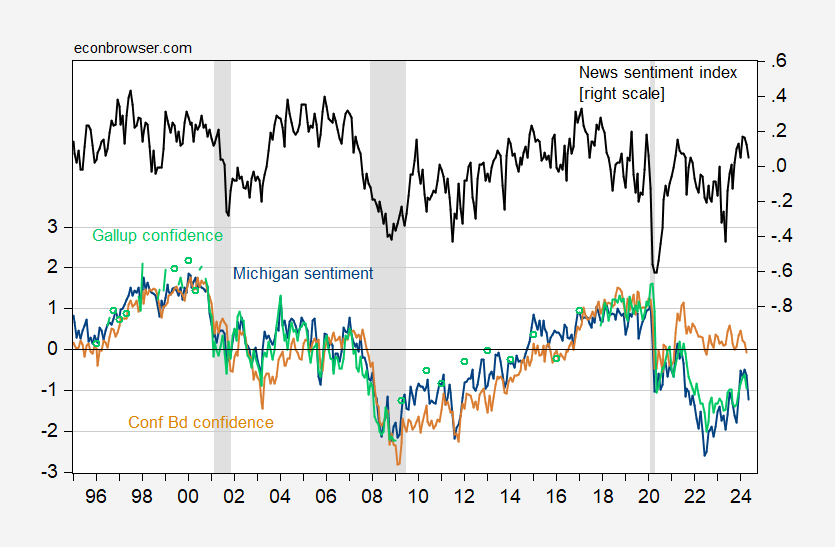While (final) sentiment as measured by the University of Michigan survey remains surprisingly downbeat given observables, the decline needs to be put into context.
Figure 1: University of Michigan Consumer Sentiment (blue, left scale), Conference Board Consumer Confidence (tan, left scale), Gallup Economic Confidence (light green, left scale), all demeaned and normalized by standard deviation (for the displayed sample period); and Shapiro, Sudhof and Wilson (2020) Daily News Sentiment Index (black, right scale). Gallup May observation is the April 30 observation, etc. The News Index observation for May is through 5/19/2024. NBER defined peak-to-trough recession dates shaded gray. Source: U.Mich via FRED, Conference Board via Investing.com, Gallup, SF Fed, NBER, and author’s calculations.
It is interesting to think about who is accounting for this pessimism. For the Michigan survey for which we have a partisan breakdown, we can conclude that, relative to mid-2016, Republicans remain much more downbeat than either Democrats, or Independents. Why they are so downbeat is hard to say; it is hard to associate it with “news” as reflected in the SF Fed’s news sentiment index.

Menzie, you indeed know the answer to these “curiosities” over the news and sentiments. You just trying to get pgl or me to say it??
I still don’t know what I did to CoRev and Peaktrader for them to put this meteorological hex on me. I said nothing about either of their mothers and the potential benefits of prophylactics. Honest I didn’t.
https://www.spc.noaa.gov/products/outlook/day2otlk.html
Moses, speaking of whose weather did what to whom (whom’s?), why did you send all of YOUR tornadoes to ME?
https://www.vox.com/climate/24155885/tornado-season-twister-clustering
Tomatoes, yes. Tornadoes, no.
The main “thoroughfare” for tornadoes does seem to be shifting east and ever so slightly north—to Dixie Alley (I guess?? as I said, I perceive a very very slight shift northward, but mainly eastward). I don’t know all the logical connections, but I do think it is due to global warming. I give you my apologies, the same way I might if I was sitting in a doctor’s waiting room and a Mexican person was sitting near me, and donald trump came up on the TV screen, I’d say “I’m sorry this loser is running our nation now, I’m extremely, morbidly sorry to you and your family”, even though it wasn’t directly my fault.
I heard about this. Stay safe.
MSNBC had some weather guy from Norman OK (did not catch him name) who kept saying we don’t know if this is related to climate change. Gee – a CoRev wannabe on MSNBC? Cough, cough.
Rick Smith is one of the NWS guys you see on TV a lot. They probably try to stay neutral on it for fear of pissing people off. Gary England (who is basically retired now) used to be a “local fixture” in OKlahoma as a TV weatherman and he denied global warming. Our local hour-glass figured TV bimbo Lacey Swope also makes jokes that global warming is just an imaginary thing. They tell the viewers (in Oklahoma, you can imagine, 90% functionally illiterate Bruce Hall types) what they want to hear and science/facts be damned.
I prefer the intelligent/educated hour-glass figured Weathergirl—Emily Sutton. She does not deny global warming. She is on TV station “KFOR”. You can probably watch her on the livestream on Youtube around 8pm NYC time tomorrow night (Saturday). I will be salivating over Miss Sutton Saturday night holding a face towel under my chin whenever the lead weatherman gives her a few moments airtime. If I had my way she would be the lead meteorologist for that station, but they never queried me.
There are a handful of household statistics which may help to explain the disconnection between unemployment, or the Misery Index (unemployment rate plus inflation rate), and consumer confidence. A rise in credit card delinquencies is probably bad for the mood of the holders of those cards. Credit card balances are rising in part because more people are carrying balance to buy groceries. Credit card rates are the highest in at least 30 years:
https://fred.stlouisfed.org/series/TERMCBCCINTNS#0
The Fed has also recently reported that nearly 1 in 5 households suffered some financial effect from natural disaster in 2023. In the South, it’s 1 in 4. The poor are, of course, disproportionately hurt:
https://www.federalreserve.gov/consumerscommunities/shed.htm
So aside from Republicans feeling bad because their guy lost the election, there are other groups whose members have real concerns about their situation, even if they are employed.
None of these real concerns are Biden’s fault. They are, however, unlikely to solve themselves, and government can play a role in dealing with then, given the chance.
This graph is pretty opaque, i.e., the disjunction between the confidence indexes and the news index is unnecessary.
In other words and despite their differing scales, it is possible to position the primary and secondary axes such that they overlap.
Otherwise, you have the raw data. Why not report their correlations?
Past blogpost have reported in sample and out of sample regression results